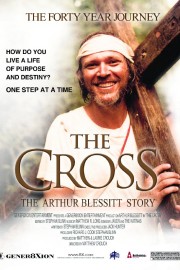The Cross: The Arthur Blessitt Story
I hope you’ll excuse the language when I say that Arthur Blessitt is the Evangelical Right’s wet dream of itself. He puts a human face on the movement, going around the world preaching the Gospel of love and forgiveness, not for the sake of fame and fortune, but simply because he was moved to do so by Christ’s example. No doubt many of the prominent figures in the modern Evangelical movement will latch onto Blessitt as an example of what they stand for.
If this happens, it would be a grave disservice to Blessitt himself, whose actions are the work of a man truly aligned with Christ in his life and soul. An ordained minister, Blessitt was moved to construct a 12-foot wooden cross in 1968, and by 1969, he had begun a trek that would taken him to every inhabited land in the world over the next 40 years, spreading the word of God’s love. Not because he looks to convert those who don’t believe as he does, but because he looks to make a deeper connection with humanity through his faith.
Matthew Crouch’s documentary uses archival footage, and recent interview sessions with Blessitt to recount Arthur’s story. But as is clear in the interviews, Blessitt is less interested in recounting his own extraordinary story- which includes run-ins with death and inexplicable occurrences- than spreading the Word of God. There are many times during the film’s 90 minutes that Arthur breaks down in telling his story. But here’s the thing- the more we get to learn about him, the more we feel a spiritual connection with that same Faith that inspired him, so that when he cries onscreen, we know he’s moved less by his plights along the way than he is in the many surprising ways God has intervened along the way.
I haven’t been to church in a lot of years- back when I was going, I didn’t really get anything out of it. And I’ll admit to being apprehensive about being the one to screen this movie at the theatre- the Evangelical right (or as my mother calls them, the self-righteous right) is one of the scariest elements to arise in modern politics in the past 30 years. While they claim to preach the Gospel, their motives are less spiritually motivated than politically (see the documentary “Jesus Camp” if you don’t believe me). And while I’ll admit recent Christian releases like “Facing the Giants” and “Fireproof” have genuinely moved me, their underlying humanism has inspired me more than their Evangelical message, although they have inspired thought in discovering my own spiritual side in the same way films such as “Andrei Rublev,” “The Last Temptation of Christ,” and others have. How pleasantly surprised I was to find that “The Cross”- and its’ subject- was more in keeping with this universal spirituality than with preaching some political agenda I don’t agree with.










